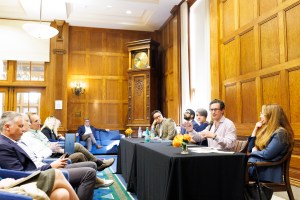Pendulating “between euphoria and despair”
Scholar probes intersection of culture and experience in Latin America
In his landmark 1845 essay, “Facundo, Civilización y Barbarie,” Argentinean author and statesman Domingo F. Sarmiento, the nation’s second president, sharply contrasted the forces at work on his young nation. He advocated for civilization, represented by European modernity, and railed against barbarism, typified by the rural, uneducated masses and the populist leaders they embraced. The polarization that resulted helped to create an enduring either-or state that precludes political compromise, says Professor Diana Sorensen. The tension has informed the history, culture, and literature of Argentina, from Sarmiento’s far-reaching political and educational reforms to the regime of Juan Perón to the nation’s current fiscal crisis.





